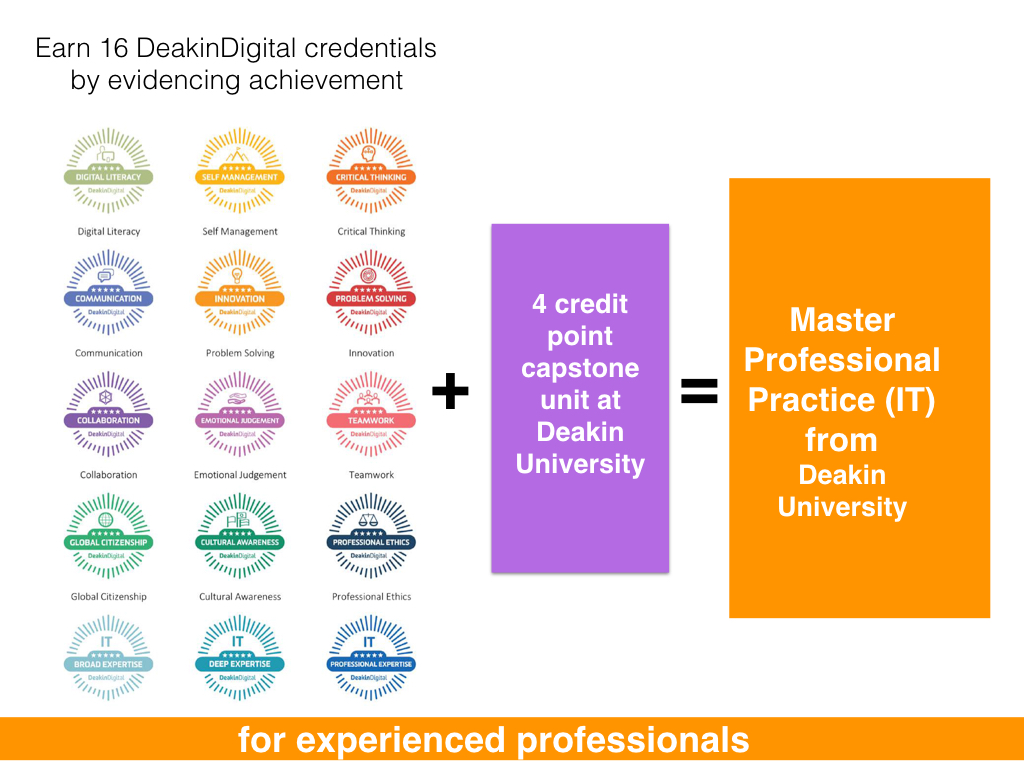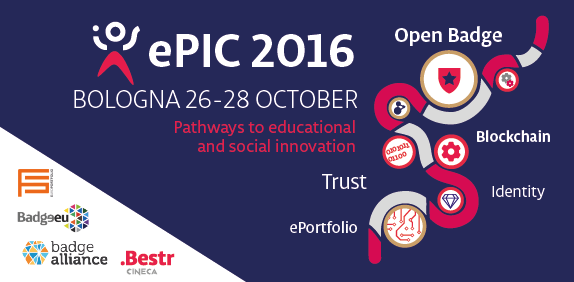
I’ve been volunteering on the Program Committee for the annual ePortfolio and Identity Conference (ePIC) for the last few years, working with Serge Ravet and others to come up with topics, lure speakers and participants, and cook up an interesting stew of ideas.
This year’s conference is being held October 26-28 in Bologna, graciously hosted by our CINECA colleagues, who are behind the Bestr platform. Inspired by the location, Serge had the wonderful idea of coming up with a new kind of Bologna Declaration: one that would focus on the practical recognition of capabilities and achievement rather than the formal delivery and assessment of learning.
This really caught my imagination and I worked with Serge to craft what is now called the Bologna Open Recognition Declaration (that’s BORD, not BORING). Here’s the header:
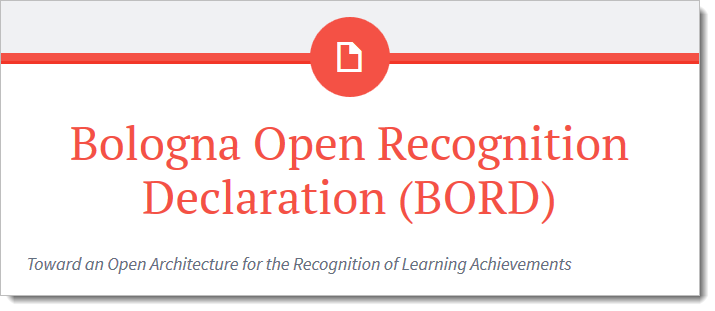
Support the Bologna Open Recognition Declaration
We’re launching the Bologna Open Recognition Declaration officially at the ePIC conference, but it’s already open for your evaluation. If you have comments or suggestions, please make them on the Google Docs version between now and October 26th.
If you feel that the Declaration aligns with your values, we encourage you to sign it by filling in the form at the bottom of the Declaration. And then share it as widely as you can. A great way of doing this is by claiming and sharing the Bologna Open Recognition Declaration badge, coming soon. (We’ll be following up with a BORD Activator badge for those who can show how they are actively supporting BORD values.)
The Declaration has already been unofficially endorsed by these well-known champions of open education:
- Sir John Daniel, former Head of the Commonwealth of Learning
- Stamenka Uvalić-Trumbic, former Chief of Higher Education at UNESCO
- Mark Surman, current Executive Director of Mozilla Foundation
- others TBA
… and the list of signatures is growing.
Why?
Because OER is not enough
UNESCO’s Paris OER Declaration called on governments worldwide to openly license publicly funded educational materials for public use.That’s a good thing. BCampus’s Open Textbook Project is already saving students tons of money – great ! But resources are not enough. MIT knew this when they started MIT OpenCourseWare. Content is not learning. You need activities, reflection, assessment – that’s assessment typically by a human being, whether it’s formative or summative.
The OER champions are certainly aware of this; they’re choosing to proceed step by step, which makes sense to me. But I also think we need ultimate goals. And it could be that my ultimate goal is not the same of all those who champion open courseware…
Because formal education is not enough
To continue: The Cape Town Open Declaration was great.OERu is great, so is FutureLearn (although I wonder if they talk to each other?)
And the 1999 Bologna Declaration proposed a vision of free student movement between countries that led to a qualification reform process now adopted by 50 countries. Great! But it’s not enough.
As BORD says:
… formal education is not accessible to all citizens and does not meet all needs. Many argue that formal education represents only a small fraction of the learning that takes place across an individual’s lifespan, most of which goes unrecognised.
This diagram about facilitating 70:20:10 from DeakinPrime, the corporate training arm of Deakin University shows how learning outside the classroom can take many forms in the workplace alone – what about communities?
Training organizations, employers, associations and communities can find better ways to help people learn the things they need to learn closer to the time that they need it.
Applied learning in action.
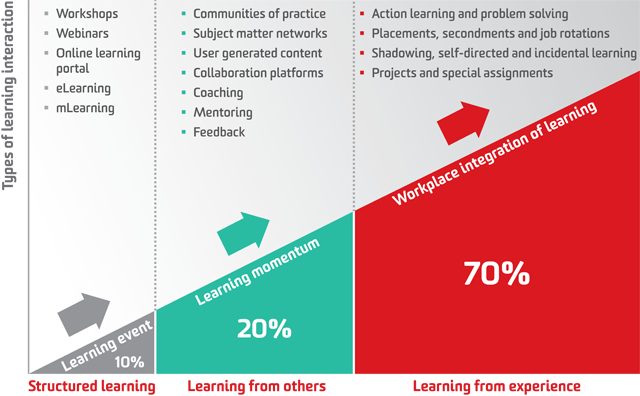
From DeakinPrime
DeakinDigital takes it a step further at that innovative university, providing a way for mid-career professionals to have their work-related learning formally recognized at the Masters level:
But it’s still not enough.
Because formal recognition is not enough
Or maybe it’s too much for the purpose at hand. Do I need a Masters degree to be selected to lead that team? Only if the selection criteria say so. Only if the selection criteria don’t include the magic words “…or equivalent”. Sometimes, as in selecting the best candidate for employment, it’s informal recognition of informal learning that’s most appropriate: the reception of signals of performance, the weighing of evidence of past performance focused on the prediction of future performance.
We need an Open Architecture for Open Recognition
Here are the objectives we set out in BORD:
-
Open recognition for all: First, we encourage everyone—learners, educators, citizens and organisations—to actively participate in and take ownership of the emerging open recognition movement. Participating includes: taking personal responsibility in one’s own learning and in the recognition of others’ achievements, contributing to the design, implementation and/or exploitation of local and/or global systems of recognition.
-
Open recognition technologies and infrastructure: Second, we call on the community of learning practitioners and technology developers to establish a trustworthy system of human and machine verifiable learning credentials and to adopt open standards facilitating the comparability and transferability of learning credentials.
-
Open recognition policies: Third, we call on governments, public authorities and educational stakeholders to implement inclusive policies facilitating and encouraging the recognition of learning achievements whether in formal, non-formal and informal settings, with bridges between all three. Those policies should ensure the existence of multiple developmental pathways, increased flexibility and accessibility and the inclusion of socially excluded and disenfranchised groups.
And Open Badges demonstrate Open Recognition
If you’ve been reading this blog before, you probably expected that this post would get around to Open Badges eventually. They may not be the only way, but Open Badges are a great way to show how open recognition can work
Again, lifted from BORD (bolding mine):
Open Badges have demonstrated that we have the means and the opportunity to put an end to the disparities of the recognition landscape. Connecting and informing competency frameworks, they become the building blocks of an open architecture for the recognition of lifelong and life wide learning achievements. They create the conditions for individuals to be in control of their own recognition, to establish their identity and agency, whether formally (within institutions) or informally (across communities).
Personal agency and control over one’s own recognition are important concepts that people like Serge Ravet are keeping alive in our Open Badges community.
Final words
Recognition, like learning delivery, is not binary; it ranges from formal to informal, as appropriate to the situation.Quality is as quality does. This relates to the type of issuer just as much as to the type of issue.
Beyond Higher Education, professional associations are already credentialing, both formally (certification) and informally (CPD). Industry associations and large enterprises like IBM are learning the community-building power that open recognition brings.
Word is spreading.
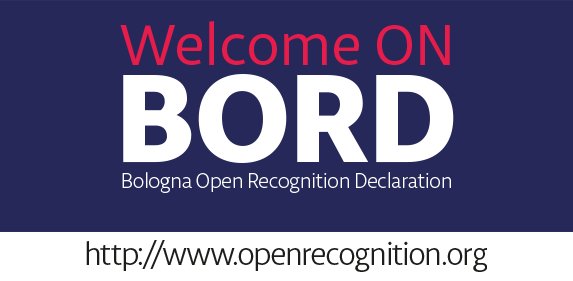
Join us at ePIC in Bologna
Help us launch the Bologna Open Recognition Declaration.
We’ll also be advancing thinking about the intersection of ePortfolios and Open Badges with Rick West, Bernard Bull, Dan Hickey, Connie Yowell, IBM’s David Leaser, Atish Gonsalves of the Humanitarian Leadership Academy and a host of other enthusiasts (see speaker list.)

